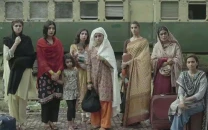The legacy of an orphan genius
Dr Muhammad Din Taseer embraced Pakistan before it became mentally closed on ideology.

The legacy of an orphan genius
His daughter, Salma Mahmud has just published her memoir The Wings of Time (Har-Anand Publications New Delhi, 2012) recalling her days with this extraordinary man. MD Taseer was brought up by the distinguished Barudkhana family of Lahore. She tells us: “Barudkhana Haveli, situated inside Bhati Gate, was the largest arsenal in Lahore after the one in the nearby Lahore Fort. It belonged to Maharaja Ranjit Singh.... After his death the British government acquired it and finally it was purchased from them by Mian Karim Buksh, father of Mian Nizamuddin”. The last named adopted an orphaned three-year-old named Muhammad Din.
The book has a list of great people who consorted with Taseer as vagrant boys when the inner city streets were their domain; and later, when Taseer was Lahore’s gilded youth. The earliest companions were Dr Nazir Ahmad — because he lived across the street — Ghulam Abbas and Badruddin Badr. Then, at Majeed Malik’s home, off Fleming Road, there were AS ‘Patras’ Bokhari, Hafeez Jalandhari and Abdul Rehman Chughtai enjoying “convivial evenings” with him.
After his PhD from Cambridge at the end of 1935, Taseer returned to India, took up teaching and went as principal of a college in Amritsar where Faiz Ahmad Faiz was to be a shy, withdrawing lecturer. Taseer was married to an Englishwoman with a wonderful medieval name, Christabel. Salma traces her mother’s lineage back to a French Huguenot refugee family savaged by Christian fanatics as Cathar deviationists.
Her sister Alys, while on an extended visit to Amritsar, married Faiz, thus linking Salma to two great poets of Urdu literature: Allama Iqbal, who married into the Barudkhana clan, wrote a radical nikah nama for the Taseer-Chris wedding.
About this wedding, Salma reveals: “Allama Iqbal, who had advised Daddy to choose a European wife, as he would never be happy with an Indian spouse, was very pleased with Daddy’s decision” (p.81). The advice was based on bitter experience. Atiya Fyzee in her memoir wrote movingly of the tragedy of Iqbal’s own difficult process of reconciliation with an Indian marriage.
Professor Hameed Ahmed Khan, from the family of celebrated orator-journalist Zafar Ali Khan, greatly admired Taseer and once described him thus: “As a small boy he recalled seeing my father with his red fez set askew over his ears, his mischievous glances, his confident demeanour, hands thrust challengingly into his coat pockets, ready to take on the world. Perhaps this liveliness was his reaction to being existentially alone in the world” (p.42).
(In 1960, this writer, while sitting in class 12 at Government College Lahore, saw Salmaan Taseer walk in to attend an economics lecture of Shoaib Hashmi, along with Tariq Ali, Shahid Rahman and Salman Peerzada. MD Taseer had died in 1953; and ‘orphan’ Salmaan in 1960 precisely matched the above description of his father.)
In Lahore, Taseer was to change his view of the Progressive Writers Movement, which he had helped found in the 1930s. He left it because of its totalitarian constriction. He found solace in the individualism of Lahore’s Renaissance-like ambience. His companions included: Hafeez Jalandhari, NM Rashid, AD Azhar, Hamid Ali Khan, Dr Aftab Ahmed, Sufi Tabassum, Professor Sirajuddin, Majeed Malik, Sufi Tabassum, and Faiz.
He embraced Pakistan before it became mentally closed on ideology. Today, he would have agreed with the stand his son took against Pakistan’s shame: the Blasphemy Law.
Published in The Express Tribune, February 5th, 2012.















COMMENTS
Comments are moderated and generally will be posted if they are on-topic and not abusive.
For more information, please see our Comments FAQ